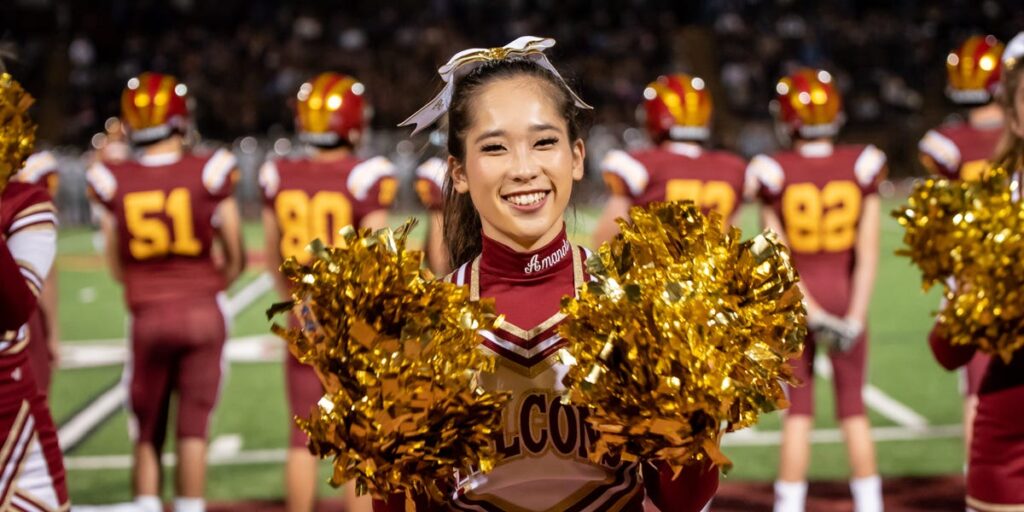Coldplay “kiss cam” participants: Welcome to Gen Z’s world.
By now, I’m sure you’ve heard of the viral “Coldplay” kiss cam saga. We can tease out the ethics of living in a surveillance state, but the reality is: Astronomer’s former CEO just learned a hard lesson about leadership, social media, and the blurry line between public and private.
Even when you think you’re not being watched, you’re being watched — and social media makes it easy for people to find out what you do after dark.
For me, it’s a story that feels familiar.
You’re always representing, even out of uniform
As part of a generation raised with social media (I’m literally three years older than Facebook), certain lessons about digital presence were hammered into me from a young age. This particular lesson — that you’re always representing the organization you’re a part of, even in plain clothes — came at age 15, when I was a sophomore on the cheerleading team at my San Diego public high school.
One morning before class, I was goofing around with a friend and fellow cheerleader at her house near our school. My friend picked up a bottle of Grey Goose vodka her mom kept on display, made a kissy face, and posed for the camera. I snapped a quick pic and uploaded it to my “finsta” — a second, more private Instagram account that was followed by 30 or so of my friends. I captioned it, “The real reason we take a free period.”
I thought I was being clearly sarcastic — I was a good student, I took AP classes, and I rarely went to parties. Obviously, my friend and I were not day drinking before honors pre-calc on a random Tuesday morning.
Please help BI improve our Business, Tech, and Innovation coverage by sharing a bit about your role — it will help us tailor content that matters most to people like you.
What is your job title?
(1 of 2)
What products or services can you approve for purchase in your role?
(2 of 2)
this data to improve your site experience and for targeted advertising.
By continuing you agree that you accept the
Terms of Service
and
Privacy Policy
.
Thanks for sharing insights about your role.
So imagine my shock when my friend and I got called into a “crisis” meeting with our head cheerleading coach, and the facts of our transgression were laid before us.
Someone’s mom had apparently also seen the photo, which was then reported to our coach. The punishment was swift: My friend and I were both suspended from the team for two weeks, which meant we couldn’t cheer at any games or perform in that week’s pep rally.
Our cheerleading program had strict standards around conduct, especially when we were in uniform. We were told we could not hug or kiss boys — even if they were our boyfriends — because we were representing the program, and there were already too many stereotypes about boy-crazy cheerleaders.
The rules governing our conduct out of uniform, however, were a lot less clear. Even though we weren’t wearing any cheer-related clothing in the Grey Goose photo, we were still representing the team, and therefore the school. I learned, at 15, you’ll be seen as a representative of the organizations you’re a part of — no matter what you’re doing.
Gen Z grew up being watched
Knowingly posting something on social media is different from inadvertently being caught by a kiss cam. But the same principle applies: Actions taken in your personal life have the potential to spill over into your professional world. That’s nothing new, but social media makes it even more pronounced — and it’s knowledge that Gen Zers like me have literally grown up with.
For now-former Astronomer CEO Andy Byron, the whole kiss cam blowup resulted in resignation from the company. Neither he nor the company’s head of HR, who was also pictured with him, has spoken about the incident, although the interim CEO has called the ordeal “unusual and surreal.”
For me, it ended a little better. I was eventually reinstated and cheered through my remaining years of school.
The ordeal, however, continued to creep into the back of my mind. As a junior, my peers and I heard horror stories of kids who’d had their Harvard acceptances rescinded because of their digital footprints. Later, in college, many of my friends who joined sororities told of sky-high standards around social media posting.
Given Gen Z’s knowledge of how easy it is to be exposed online, it’s not surprising that we’re engaging in online behaviors that seek more privacy. In a survey of more than 600 Gen Zers by the Gen Z consulting and research firm dcdx taken last year, more than 60% of respondents said they wanted their online presence to be more private, not less.
“Finsta” culture, which was all over my high school in 2017, is still alive in the form of “close friends” stories or secret second accounts, which create another level of exclusivity among those who can see what you post. Adam Mosseri, Meta’s head of Instagram, recently said that much of the action on the app was happening in DMs — not on users’ grids or feeds.
The problem is that, as I’ve learned, even what you think is private isn’t private. You can’t control who screenshots and shares what they see.
“Coldplaygate” is emblematic of a world Gen Z has been living in essentially since we were born: On social media, your public and private lives aren’t separate. They’re one post away from crashing head-on.
Read the full article here


